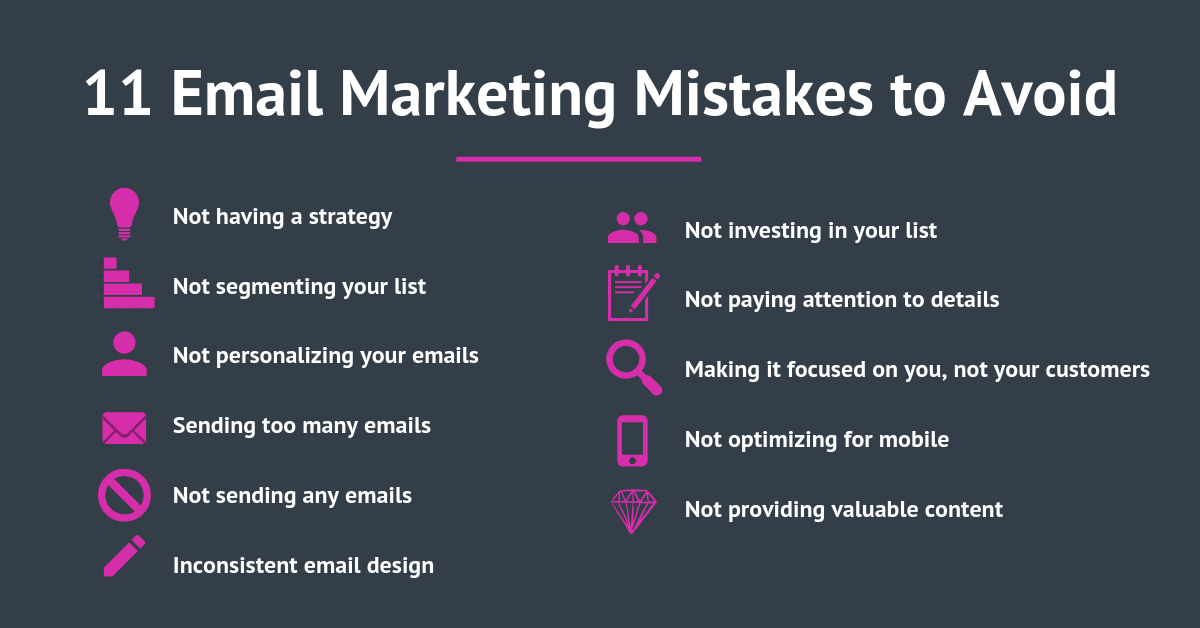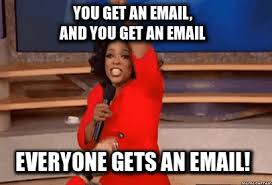Pet peeves are a regular part of life. We all have our email pet peeves, like overused sign-offs or long-winded messages. But today we’re going to tackle email marketing mishaps that are far worse.
In our many years of experience with email marketing, we’ve had an inside look at the mistakes that have been overlooked when someone presses send.
So if you’re looking to establish an email marketing strategy that works (and avoid some major embarrassment along the way), here are 11 mistakes you’ll want to be sure to avoid:

1. Not having a strategy
The first and worst: not having an email marketing strategy at all! This might manifest in a number of ways, but often it looks like sending inconsistent, sporadic emails without knowing what you want to accomplish.
It might be one email here, another one there, with the hopes that somehow it will move the needle for your business. But that’s rarely the result.
Email is still one of the most powerful tactics you can use, regardless of your industry. So having a high level strategy is important. This will build off your overall marketing strategy, but it starts by being intentional about the emails you send.
Put it in practice: Create an email calendar. Start with a list of the emails you know are coming down the pipeline plus the ones that automatically send. By making a list, you can get an overview of the experience you’re creating for your subscribers—then map it out on a calendar.
 2. Not segmenting your list
2. Not segmenting your list
Because it can be a challenge to get any email out the door, another big mistake that many companies make is sending one email to the entire list. While it might feel like a win in terms of efficiency, it’s coming at a huge cost to the success of your campaigns.
According to Campaign Monitor, marketers have noted a 760% increase in revenue from segmented campaigns.
That’s no small number!
In our opinion, it’s better to send fewer emails targeted to specific personas than send a bunch of generic emails with low open rates and an insignificant dent in your marketing goals.
Take the time to segment your lists up-front by your personas—you won’t regret it!
 3. Not personalizing your emails
3. Not personalizing your emails
On a similar note, it’s a miss if you don’t personalize your emails. If your lists are segmented and you’ve created them carefully, you’ll have valuable information like your contacts’ first and last names. Why not address the email to them?
In most email platforms, from Mailchimp to HubSpot, it’s easy to add personalized fields like your contact’s first name.
Even this minimal level of personal touch will start to increase open rates: emails with personalized subject lines are 26% more likely to be opened. And you don't have to stop with names. Leveraging your CRM effectively will give you relevant information about your customers that can be used to tailor an email without being creepy.
So not only do you create a better experience for your subscribers, but you also increase the likelihood that they will read your content. It’s a win-win.
4. Sending too many emails
You don’t want to be the LinkedIn of 2019. By having a strategy and a written email calendar, you can navigate the emails that you send and make sure you aren’t overwhelming your prospects or users with communication.
Plus, your marketing team might not be the only one sending emails to potential customers on a given day! What if they are also receiving email communication from sales or your support team? This adds up and can leave a bad taste in the mouths of your customers.
Pro Tip: Make sure you think about any automated emails that a customer might be enrolled in, too. If they are receiving automated welcome emails or monthly newsletters, you want to make sure you track that on your calendar as well!

5. Not sending any emails
This is the other side of the coin to sending too many emails. There’s nothing worse than having a great email list and never communicating with them!
Not only does this decrease credibility if you ever hope to email this list in the future, but you’re also missing an opportunity to share valuable information with these subscribers. If you’ve created your list correctly, these people have opted in to receiving communications from you! It’s missing a valuable opportunity to share insights and stories with them about your business and what you stand for.
6. Inconsistent email design
It’s okay if your branding and design have changed and evolved over time. That’s normal and probably a good thing! But it is a miss if you don’t update that design in your emails. Especially when it comes to your automated emails! If you are sending emails on a consistent basis, you want to use them as a tool that adds to your overall brand experience, not detract from it.
Go back to your long list of emails (planned and automated) from the first mistake and make sure the design is consistent! This doesn’t mean every email will look the same, but make sure you don’t have an old company logo or outdated header!
7. Not investing in your list
By not investing in the upkeep of your list, you can miss out on potential opportunities to connect with prospects or subscribers. This can look like not adding to your list when you receive new contacts or keeping bad contacts on your list.
The bounce rate and spam score are important metrics, especially because email service providers look at them too. This reflects poorly on your business, so it’s a good practice to evaluate your list regularly and remove the inaccurate email addresses!

8. Not paying attention to details
Going on and on about proofreading your emails might sound like a broken record. But if we all know that it’s something we should do, why do we still struggle with it so much?
Take the extra time to pay attention to the details in your email, like your grammar and the links. It shows when you don’t! One of our favorites? When the preheader of your email still reads: “view this email.” It proves that you didn’t care enough to dot your I’s and cross your T’s.
We’ve created an email checklist that we walk through every single time right before we press send. It covers the basics but also includes a step to read the email out loud before you send it on its way. It’s amazing the things you catch when you take the time to read it out loud!
9. Making it focused on you, not your customer
This one is true for any marketing tactic but shows up a lot in emails. It’s really easy to start every sentence with “we.” But instead, try to eliminate every mention of your company in the first sentence or paragraph. Make it about your reader, and the difference will show in the content that you write!
Start by reworking some of your sentences. Instead of, “We are excited to celebrate the grand opening of our new space!” write “You’re invited to a grand opening celebration!”
It keeps your readers at the center of your communication and shows them just how valuable they are to your business!
10. Not optimizing for mobile
Mobile isn’t just the future. It’s the reality when it comes to your email marketing. Up to 70% of your readers will be reading your email on their mobile device. That means mobile should be your primary focus when you write and design your email.
At the very least, make sure you send a test email to your phone before you hit send!
11. Not providing valuable content in your emails!
This final mistake might be most costly in the long run. If your emails aren’t providing valuable information that your readers want, you’ll struggle with your email marketing, no matter what your strategy! Add value to their lives with the content that you share and you’ll be on your way!
Start with the strategy and create a plan that uses your emails to accomplish your marketing goals! Then be sure that strategy helps you avoid these common mistakes you might face with your lists, design, and cadence.
From optimizing for mobile, to tailoring content, to enabling more consistent email design, a marketing platform like HubSpot can make email marketing feel much easier. They have different subscription levels for different needs and budgets, so check out our buying guide to see what would help you the most.



